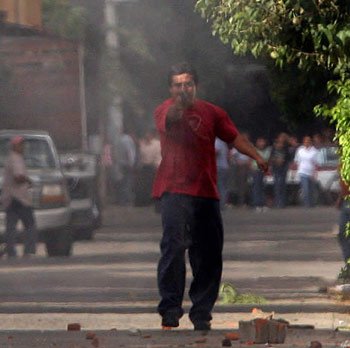NYT: Mexican Protesters Keep Their Message Alive, and on the Air
OAXACA, Mexico, Oct. 30

As the federal riot police hunkered down in Oaxaca’s main square on Monday, protesters sought to protect their not-so-secret weapon in their five-month siege of the city: the pilfered radio transmitter they use to mobilize the population.

The barricaded radio station at Oaxaca University where protesters have broadcast messages to their supporters. More Photos »
“We are in a red alert, a red alert!” a nervous-sounding announcer said over and over from inside the bullet-scarred university station, which was ringed by sandbags and protected by masked supporters on the roof equipped with handmade mortars. “The police are moving in!”
The cry was premature, but it drew hundreds of supporters from across this city in southern Mexico. They prepared Molotov cocktails and reinforced the barriers around the gates of Oaxaca University in anticipation of a raid.
“We will transmit until the last minute,” an announcer who described himself as a law professor, but declined to provide his name, said in an interview. “We will not run. We are like the captains of the ship, and we’ll go down with the ship.”
Oaxaca State’s beleaguered governor, Ulises Ruiz, was also hunkered down, on his own turf. The federal police remained in control of the central square on Monday, but protesters marched through the rest of downtown, denouncing Mr. Ruiz and occasionally setting fire to vehicles.
Although the governor insisted in a television interview on Monday that he would not resign, his support appeared thin as both houses of the Congress passed nonbinding resolutions urging him to cede power for the good of the state and the nation.
In the Chamber of Deputies, only Mr. Ruiz’s Institutional Revolutionary Party, known as the PRI, and another small allied party stuck by the governor, and even that backing seemed lukewarm.
In the Senate, even the PRI joined in a statement urging Mr. Ruiz to “reconsider separating himself from charge, in order to contribute to the re-establishment of governability, normality and peace.”
But the governor said he was not budging. “I am governing Oaxaca,” he declared in a late-night news conference, dismissing the protesters as a relatively small group that did not represent the masses. “The questions of Oaxaca will be decided by Oaxacans.”
Mr. Ruiz said the arrival of federal troops had not resolved the crisis but might establish an environment where the opposing parties could resolve their differences at the negotiating table. As for the graffiti painted around town accusing the governor of being an assassin, he declared, “I don’t accept their views. I respect human rights.”
Members of the Oaxaca People’s Popular Assembly, which has been coordinating the protests, clearly disagree, as their frequent anti-Ruiz messages over the radio make clear.
If the diffuse movement that has laid siege to Oaxaca has a nerve center, it is the trash-strewn conference room where the group broadcasts regular updates to their comrades.
On Monday, the radio called people into the streets for three protest marches that drew thousands. Announcers also mourned three people who the protesters said had died in a raid on Sunday. The government said it had no information of any deaths at the hands of the police.
Even after the federal police raid managed to take back the symbolic Zócalo, or central square, the station kept the movement alive.
The protest began as a teachers’ strike, but a deal was reached to raise their salaries. Some teachers returned to classes on Monday, although it appeared that many were not sure it was safe to do so.
While the protest coalition consists of leftists, local residents have said that the issue is more a struggle to wrest control of the state from the PRI, the political party that once controlled all of Mexico, but whose national power has greatly diminished.
“It’s strange, but I’m not afraid,” Alejandra Canseco Martínez, 22, a student who frequently sends out updates over the airwaves, said from inside the radio station. “Maybe I should be afraid, because we don’t know what will happen and the police are only a few blocks away.”
It is not the first time that the station has been under siege.
The current standoff began June 14, when the police broke up a teachers’ protest and smashed the transmitter that the teachers had been using to broadcast their messages from the main square. The following day, as supporters joined forces with the teachers, university students took over the campus station.
On July 22, gunmen opened fire on the station, sending workers ducking for cover and eventually knocking the signal off the air. But listeners heard the attack and converged on the station in support.
On Aug. 8, someone sneaked into the station and poured acid onto the transmitter, again killing the signal. But by that time, protesters had taken over another station. Within weeks, a dozen public and private stations around Oaxaca were controlled by protesters.
However, the university station, with its transmitter repaired, remains the chief source of information for the protesters. Its messages are dismissed as revolutionary propaganda by critics, but supporters relish the hard-edge words that fly across the colonial city.
“The other stations only say things in support of Ulises,” said Sal Lozano, 43, a farmer, speaking of Mr. Ruiz, the governor. “We’re going to defend this station with everything we have.”





 Photo: D.R. 2006 El Universal
Photo: D.R. 2006 El Universal


